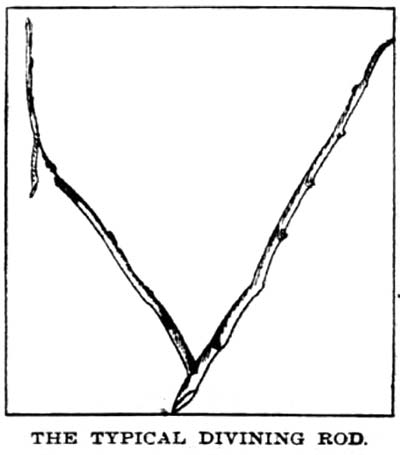Is Divining A Form Of Self Delusion ?
If you meet one of your friends walking around a paddock with a German sausage supported between his hands, don't jump to any hasty conclusions.
It isn't necessary to inform the police.
He may not have gone mad.
He may not even be on his way to bury the body.
He is probably trying out the latest in divining rods.
This is not a frivolous suggestion.
The use of a German sausage as a divining-rod is seriously proposed by one of the many writers on this ever green subject.

The most amazing feature of divining or dowsing is that it continues to attract a following.
The diviner is a historical survival, a relic of an age of simple unquestioning belief.
Divining has its failures and its apparent successes.
I have known many dud bores sunk at the instigation of diviners and also many successful ones.
You encounter people who believe in dowsing.
Where does the truth lie?
Are not the successes just flukes?
Is it not a fact that the diviner is merely a person with a normal eye for the external physical indications of water, and one who, at the same time, subconsciously reacts through muscular movement and the rod?
Is not the whole game a form of self-delusion?
Claims To Find Anything
Dowsing has an extensive literature.
As recently as 1930 and 1933, two books on the subject were published in France.
An Irish professor, who spent nine years investigating the claims of 200 dowsers, wrote a two-volume treatise on his findings.
The quantity of literature is apt to impress people, but informed opinion takes another view: "A whole library of learned rubbish; jargon for charlatans; marvellous tales for fools; and amusement for antiquarians," said one
scientist.
The conceit of the dowser knows no boundaries.
He claims to be able to locate water, oil, minerals, disease in plants, animals, or humans, lost property, in fact, says one authority, any thing the dowser cares to fix his mind upon.
He lays claim to an uncanny power of discrimination.
He can distinguish between still and running water, salty or fresh water, between different metals, and even different kinds of wine.
In "The Modern Dowser," published in 1930, le Vicomte Henry tells of a dowser who undertook to reclassify a lot of bottles of Burgundy and Bordeaux, which had survived a bombardment.
He did the job without a single mistake.
One diviner didn't need to walk over the ground to locate water.
He could find it by dangling a pendulum over a map of the estate !
Traditional equipment of the dowser is a hazel twig.
But a whole host of other materials is used.
One worked with a copper pipe ending in a spoon into which was put a small quantity of the substance it was desired to locate.
The use of a little salt presumably to take with the tale, enabled
the diviner to discriminate between fresh and salty water.
Fencing wire, whalebones, willow twigs, watch-springs, and candle-snuffers have each their strenuous advocates.
The crowning example, as mentioned above, is a German sausage.
Although its virtues are acclaimed in apparent good faith, the proposal may be a subtle form of Nazi propaganda.
I commend the idea for what it is worth only.
Land Study Beats the Fork
Some diviners do not require any trappings.
They claim to be able to detect water by walking along with their arms stretched before them, palms downwards.
Another does not need to exert himself to that extent.
He feels a tingling in the nape of his neck when he passes over underground water, a faculty which could be as disadvantageous as it was useful.
Many people are converted when a bore sunk on the spot indicated by a dowser turns out satisfactorily.
Admittedly, thousands of successful bores have been located by dowsers, but this proves nothing.
Comparisons in New South Wales show that any intelligent person can locate water with more certainty by a study of the land than the diviner can with his fork.
The hocus-pocus of dowsing reaches its climax in the "explanations" offered for the movement of the rod.
Science is raided, its principles distorted, and its language borrowed to build up plausible theories to impress and over
whelm the unscientific.
Magnetism, electricity, cosmic rays and radiations of infinite variety are all called in to "explain" the art.
None of these theories would stand up to scientific investigation.
They are speculation pure and simple.
If you dare to question them, you are challenged to provide a better.
By "THE SCEPTIC"
Weekly Times 17 June 1939
